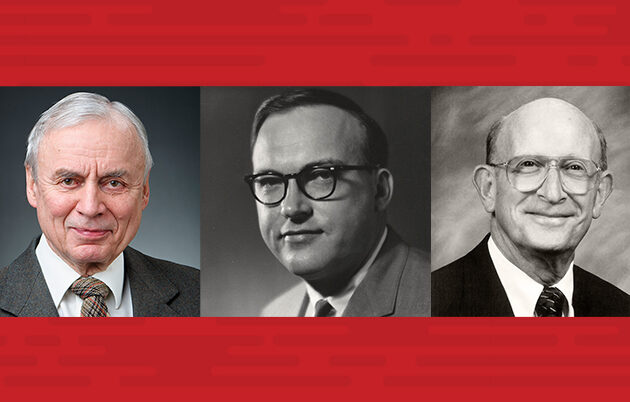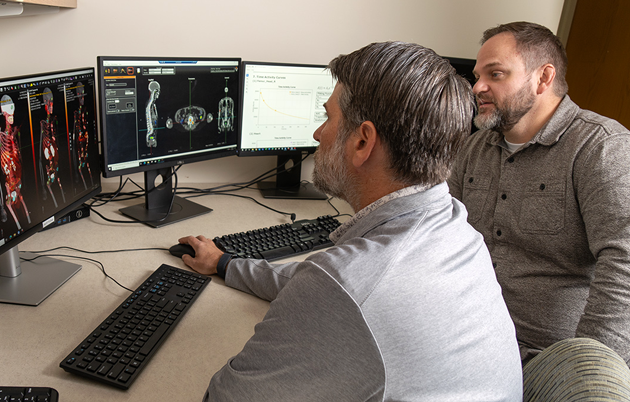Golden Legacy
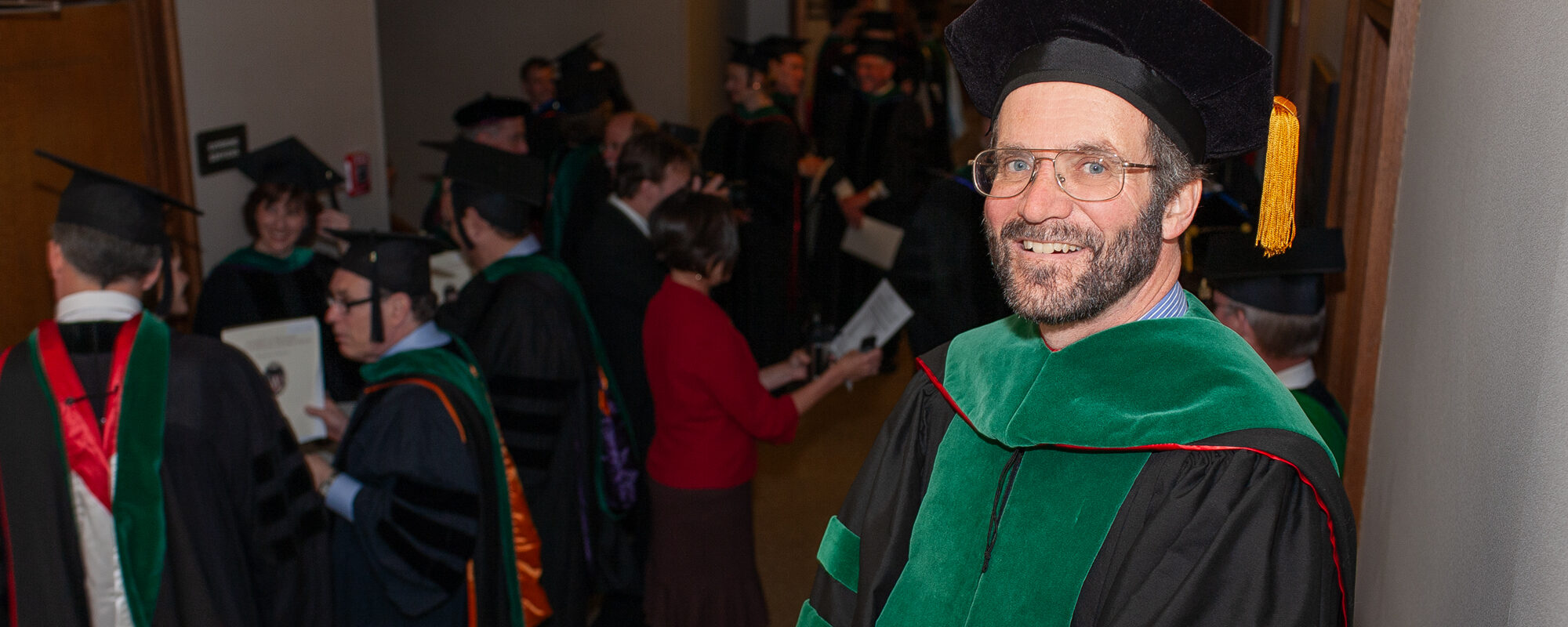
A psychiatrist, a dean and a vice chancellor walk into a bar … This sounds like a set-up for a classic joke, but in this case, it is reality, referencing a leader who has made wise use of humor. As a holder of all three roles, Robert N. Golden, MD, has shared witty remarks throughout his more than 18 years as dean of the University of Wisconsin School of Medicine and Public Health (SMPH) and vice chancellor for medical affairs at UW–Madison.
His role as SMPH’s ninth dean began in July 2006, under John D. Wiley, PhD, then-chancellor of UW–Madison. Now one of the longest-serving medical school deans in North America, Golden indicated to UW–Madison Chancellor Jennifer Mnookin, JD, PhD, in January 2024 his intent to step down from his dean and vice chancellor roles when a successor is in place; a national search is nearing completion. A professor in the Department of Psychiatry, Golden will shift his focus to mentoring faculty members and trainees.
He reflects, “It has been an incredible honor and privilege to serve as dean and vice chancellor for medical affairs. I will always cherish the experience of working with so many remarkably talented and dedicated individuals within our school and our academic health system, as well as our wonderful campus colleagues and external partners.”
Mnookin states, “We are deeply indebted to Dean Golden for his many incredible years of service to our students and for all his leadership in service to the health of our state’s residents. His tireless dedication embodies the Wisconsin Idea and innovation for the public good. He has worked hard across almost two decades to strengthen health care in every county of Wisconsin, and it shows.”
In agreement, Ned H. Kalin, MD (PG ’79), chair of the Department of Psychiatry and Hedberg Professor, says, “Bob Golden has been an exceptional dean and is an extremely accomplished academic psychiatrist. With his bright intellect, quick wit, great sense of humor, and big heart, the positive impacts of his leadership have been felt at every level of our institution. While we will miss having him as the dean, we cherish him as a mentor and colleague. We are looking forward to having him come back to our department, serving as an admirable role model, and imparting his wisdom and empathy to our residents and others.”
Launching Dual Careers
In 2006, Golden and his wife, Shannon Kenney, MD, felt warmly welcomed when they moved to Wisconsin to launch new phases of their careers. An internationally recognized expert on Epstein-Barr virus and associated diseases, Kenney is a professor in the SMPH Departments of Oncology and Medicine and a board-certified specialist in infectious diseases. Now a Wisconsin Alumni Research Foundation Professor and the Wattawa Bascom Professor in Cancer Research, she co-leads the UW Carbone Cancer Center’s Virology Program and has been continuously funded by the National Institutes of Health (NIH) since the start of her faculty career.
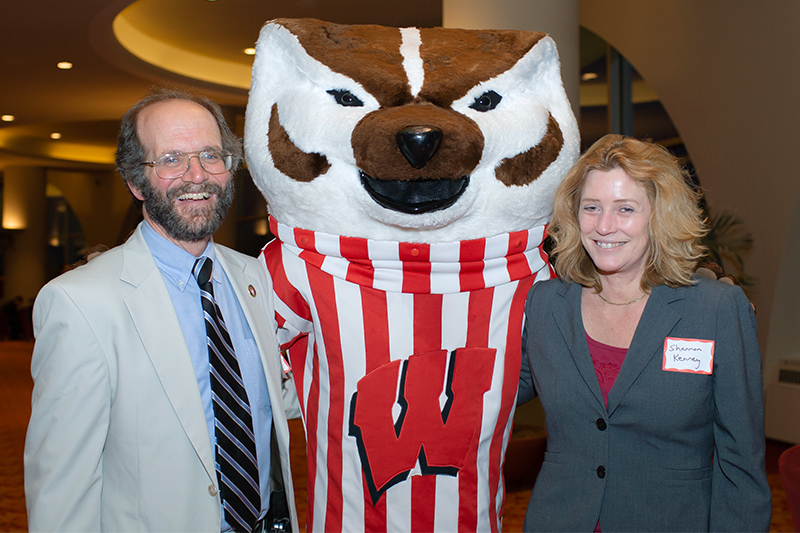
Golden has led extraordinary advancements in SMPH’s education, research, clinical and community service missions, and built relationships with philanthropic donors leading to critical funding support. Fostering collaboration has been a hallmark of his leadership. His efforts have ranged from integrating disciplines to strengthening ties in the school’s statewide campus; to creating new departments and centers; and to supporting innovations in curricula.
His approach is to surround himself with “bright, committed people who share a vision,” he says. “People are more important than programs. To develop great programs, we must foster success among those who will shape and implement the plans.”
Golden likens his role to that of an athletic director who “picks the right coaches, sets an overall vision, and supports each coach as they develop their players into a winning team.”
He adds, “I like to synthesize different perspectives, viewpoints, and ideas. I take my work very seriously, but I just cannot take myself too seriously.”
Integrating Medicine and Public Health
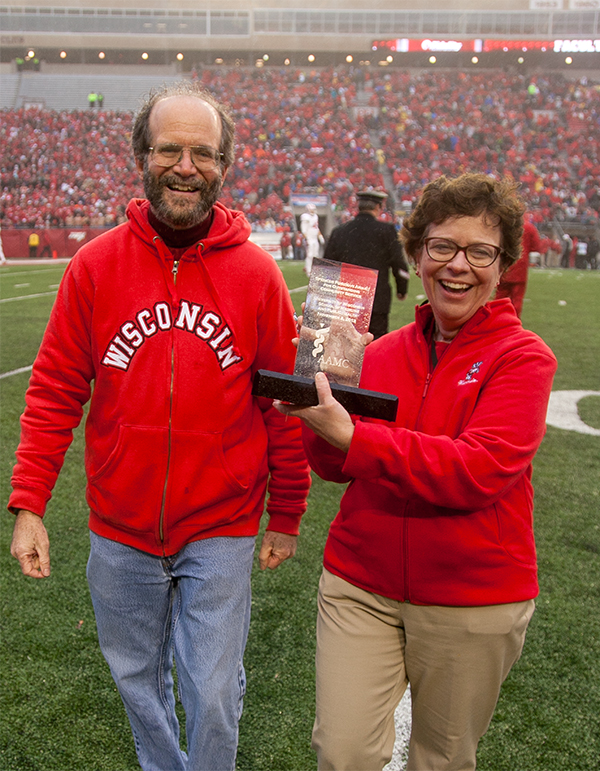
When Golden moved into the Health Sciences Learning Center, the UW Medical School had recently changed its name to the UW School of Medicine and Public Health, as the nation’s first school to combine these complementary fields. He established teams to redefine the school’s missions to emphasize disease prevention and health promotion — in addition to diagnosing and treating disease — with a focus on addressing health disparities.
Prior to Golden’s arrival in 2006, former dean Philip M. Farrell, MD, PhD (PG ’72), signaled that work to integrate the disciplines had only begun. Farrell stated, “As Bob has said in conversations with me, the new UW School of Medicine and Public Health must be more than just a name change. He knows that many cultural, philosophical, and programmatic changes are required … I am certain that Bob can move the institution steadily along on its upward trajectory.”
Golden reflects, “I think this integration was among the school’s greatest accomplishments during my time here, and it remains a work in progress. We have done careful strategic planning; created synergies; and increased interactions throughout the university and with communities, local and state health agencies, and other organizations across Wisconsin.”
Grateful for mission-critical funding and support from the school’s Wisconsin Partnership Program, which had been established in 2004 (see Quarterly, Volume 26, Number 3, 2024), Golden says the blending of medicine and public health has gained traction nationwide.
A 21-year career at the University of North Carolina (UNC) helped prepare Golden for his SMPH deanship.
At UNC, he initially ran an 18-bed psychiatry inpatient unit; conducted NIH-funded research on the biology and pharmacology of mood disorders; and was an award-winning teacher. He became the associate director of the General Clinical Research Center and Mental Health Research Center, then chair of the Department of Psychiatry. Under his leadership, the department grew to include 85 full-time faculty members, and its NIH research portfolio jumped from $3 million to more than $20 million per year. Golden also led a development program that produced a substantial endowment. In his final role there, as vice dean of the UNC School of Medicine, he was responsible for research and educational programs; faculty development and academic affairs; and the affiliated Area Health Education Centers across the state.
Creating One UW Health
Golden is proud of helping the academic health system restructure in 2015, creating a single clinical entity referred to as UW Health. A year later, in the Wisconsin Medical Journal, Golden and Jeffrey Grossman, MD (PG ’78), who became interim CEO of the newly restructured health system, wrote, “The merger of the hospital and physician components of [our clinical enterprise] was very much predicated on creating a more efficient infrastructure that would allow us to support the work of the academic health system of the future.” Golden says the partnership benefits those who matter most: patients and communities.
Crediting UW–Madison Chancellor Emeritus David Ward, PhD, with sharing his knowledge during that period of change and beyond, Golden says, “David has been an outstanding role model and mentor. He imparts his incredible wisdom and experience while opening doors for broader input.”
In turn, Ward admired Golden’s vision. “When I returned to Madison as interim chancellor in 2011, I found the campus with some tense divisions. I quickly realized there was also a commitment to move forward rather than reflect on the challenges of the immediate past,” says Ward. “Bob Golden was firmly focused on the future and determined to push for an ambitious reorganization of the health sciences. This engaged many constituencies within and beyond campus, and our collaboration made possible an effective consultative process and rich reflections of how to lead major changes in an academic setting.”
The SMPH dean alternates between serving as chair or vice chair of the UW Health Board of Directors. In 2016, as board chair, Golden led the recruitment of UW Health CEO Alan Kaplan, MD.
Kaplan says, “Health care is a team sport, and I couldn’t have asked for a better teammate than Dean Golden. It’s the coordination of clinical care and community service with research and education that makes our academic health system so remarkable.”
Making Strides in Parity
Gender parity among SMPH leaders is a significant accomplishment for Golden, who has recruited, mentored, and promoted qualified women to leadership roles in the school and continued to foster their success.
Describing factors that fuel this drive, including observations of gender-based barriers Kenney faced in her training and career, Golden says, “In academic medicine, historically, women have been marginalized. Everybody should be given an equal shot at achieving their full potential.”
He continues, “When I arrived here, only one woman, Dr. Ellen Wald, was serving as a chair. I am pleased with our cultural shift. We pick the best person for any given position, with the expectation that we will achieve overall gender parity in leadership positions. Now, about half of our chairs are women, and this makes it easier to attract the most talented women and men who want to work where there is parity. But we have a long way to go in other aspects of inclusivity.”
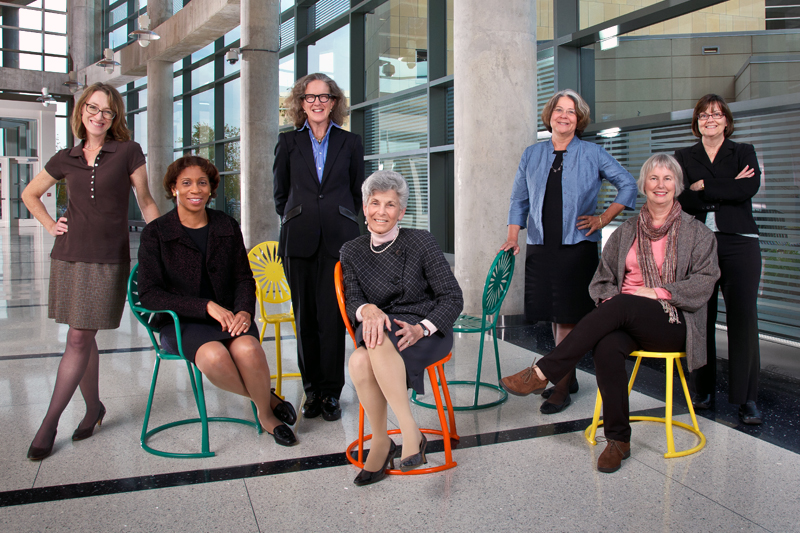
Noting that programs such as Centennial Scholars and Centennial Clinicians, both founded during Golden’s deanship, have furthered this goal, he says, “If we want our school to be the best it can be, we must have a culture that includes and embraces individuals from a variety of backgrounds.”
The effect has been transformational, according to Deneen Wellik, PhD, chair, Department of Cell and Regenerative Biology. “Having moved from an institution where women did not have an equal opportunity to participate in leadership, I have witnessed the difference at the UW School of Medicine and Public Health. That difference permeates everything about the culture,” says Wellik. “Dean Golden has clearly led this change. Most institutions, including our own, have instituted diversity, equity, and inclusion offices and courses, and they hope these offices can participate in educating about cultural change. However, having the person in charge who lives that change is more powerful — and necessary — to enact real change.”
Chief of Staff L. Allison Golden, MA (no relation), comments, “Dean Golden’s love of the field of medicine and its people shines in all he does. He has an authentic value system and ‘family-first’ mindset, which he models himself and supports for others. The combination of his deep commitment and joy in his work and family makes him an especially effective mentor.”
Educating the Next Generation
The School of Medicine and Public Health includes five health professions degree programs — Doctor of Medicine (MD), Doctor of Physical Therapy, Master of Genetic Counselor Studies, Master of Physician Assistant Studies (MPAS), and Master of Public Health (MPH) — plus 27 doctorate and graduate-degree programs. The borders of the school extend to the entire state. Health professions students learn from hundreds of adjunct faculty at hospitals and clinics throughout Wisconsin.
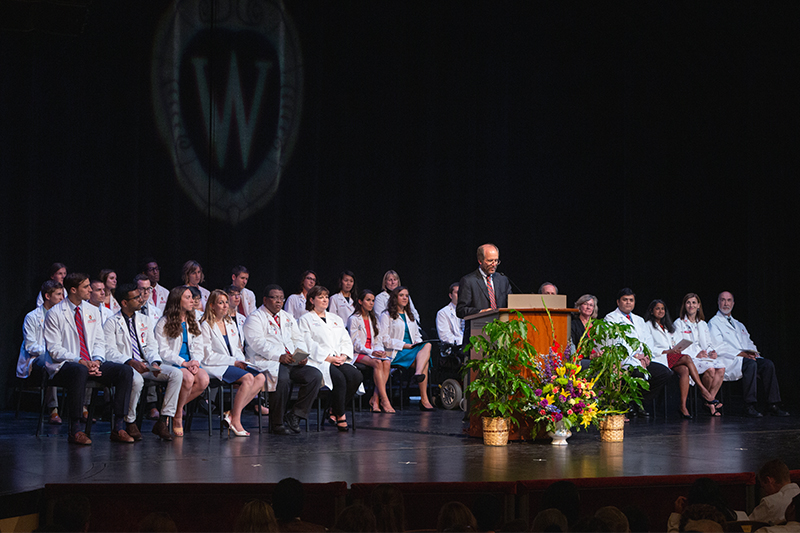
As part of the integration of medicine and public health under Golden’s leadership, teams redesigned the MD curriculum, established a Preventive Medicine Residency Program, and significantly expanded the MPH program, which was founded in 2005 and has graduated 713 alumni to date. The MPH program now offers nine dual-degree options to combine public health training with other fields.
Golden has prioritized the health needs of people in underserved rural and urban areas of Wisconsin. This led to SMPH’s 2007 and 2008 launches, respectively, of the Wisconsin Academy for Rural Medicine (WARM) and Training in Urban Medicine and Public Health (TRIUMPH) program.
WARM trains medical students who intend to practice in rural areas. Of its 301 graduates, 74 percent are practicing in Wisconsin.
As for TRIUMPH, 99 percent of its graduates have pursued residency training in urban areas, and nearly 34 percent have returned to Wisconsin after their residency training.
In partnership with UW Health, the school also established the nation’s first rural-track obstetrics and gynecology residency program, as well as rural residency tracks in family medicine, psychiatry, and surgery.
The MPAS program started distant tracks in Wausau and Platteville, Wisconsin, in 2012 and 2023, respectively, to help address shortages of health care professionals in those regions.
And in 2012, SMPH launched the Native American Center for Health Professions to enhance the recruitment, retention, and graduation rates of Native American health professions students and to promote health education, research, and community-academic partnerships with Native communities. Through these efforts, SMPH is among the top 10 schools in the nation for graduating American Indian and Alaska Native students, according to data from the Association of American Medical Colleges.
“Dean Golden has been a tireless champion for the development and implementation of so many innovative health professions education initiatives. He has played an instrumental role in helping establish, shape, and support unique programs that promote health equity within and beyond Wisconsin. He inspired the growth of our MPH and dual-degree programs, and helped expand global health initiatives,” says Elizabeth M. Petty, MD ’86 (PG ’89), senior associate dean for academic affairs, SMPH, and professor, Department of Pediatrics. “In addition, Dean Golden has guided and supported our faculty in optimization of the learning environment with a focus on building community, growth of student research programs, and enhancement of services that support the success of students from all backgrounds. I deeply appreciate his thoughtful wisdom and generous spirit. He has been an inspirational leader, incredible mentor, and trusted colleague.”
Bolstering Research
A staunch advocate for SMPH’s research endeavors, Golden has overseen increases in NIH funding from $135 million in 2006 to nearly $246 million in 2022, with the cumulative total of NIH funding awarded during Golden’s leadership exceeding $2.97 billion. In the most recent national rankings (2023), the school is 22nd in NIH funding, according to the Blue Ridge Institute for Medical Research. The highest ranking in the school’s history, this “reflects the incredible productivity of our faculty and leaders,” says Golden.
Anjon “Jon” Audhya, PhD, senior associate dean for basic research, biotechnology, and graduate studies, notes, “Dean Golden’s leadership has been instrumental in growing our research enterprise, with a focus on innovation, scientific impact, and collaboration. He has demonstrated a remarkable vision for advancing academic excellence and ensuring that our faculty, staff, and learners have the resources and support they need to thrive. I have been incredibly fortunate to work alongside him, as he has fostered the formation of many interdisciplinary research partnerships, guided by a clear commitment to diversity, equity, and inclusion.”
SMPH researchers are global leaders in Alzheimer’s disease and related dementias; asthma; infectious disease; medical imaging; personalized medicine and genomics; social determinants of health; stem cell and regenerative medicine; and much more. Additionally, the portfolio of industry-sponsored clinical trials has recently doubled.
Shortly after Golden arrived at the school, the NIH announced the competitive Clinical and Translational Science Award (CTSA) Program, which supports “bench-to-bedside” research and multidisciplinary collaboration. In 2007, SMPH received CTSA funding and launched the Institute for Clinical and Translational Research.
To accommodate expanding research activities, Golden has led a more than 50 percent increase in facility space, which includes building the second tower and a wedge structure of the Wisconsin Institutes for Medical Research (WIMR), a cutting-edge translational and interdisciplinary research complex. Under his leadership, five new departments have been created, and several departments are ranked among the top 10 in their field for research funding.
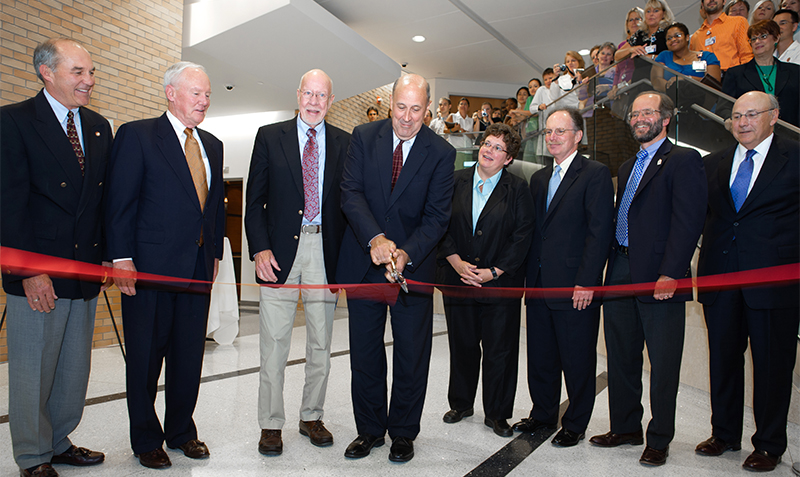
“It boggles my mind that as soon as we open a building, we need even more space due to our faculty’s amazing momentum,” observes Golden.
He notes that the recently opened UW Health Eastpark Medical Center was built with space dedicated to clinical research, in addition to its primary mission of patient care.
Boosting Philanthropy
Annual fundraising increased more than tenfold under Golden’s leadership, bolstering research and student scholarships. In 2019, SMPH and UW Health initiated their first joint comprehensive campaign for Wisconsin Medicine, which has raised more than $500 million.
Calling scholarships the “magic sauce” for recruiting an increasingly diverse cohort of future physicians, Golden says, “About 30 percent of our incoming medical students come from backgrounds that are underrepresented in medicine. This is a dramatic improvement since I arrived. If we want people to follow their dreams and if we want a heterogeneous physician workforce in the future, we must improve access to medical education in many ways, including affordability.”
Connecting With Alumni
In addition to daily meetings, Golden’s calendar is dotted with special events, many hosted by the Wisconsin Medical Alumni Association (WMAA) for alums from near and far to stay connected with each other and SMPH.
“Dean Golden may have come to Madison as a Tar Heel, but he is now a Badger through and through,” says Sarah B. Rothschild, WMAA executive director. “From joining the WMAA to present awards to student preceptors across the state, to sharing his annual ‘State of the School’ address at Medical Alumni Day, and to personally responding to ideas or concerns raised by alumni, Dean Golden has been a stalwart supporter of this association and those who earned their degrees at the UW School of Medicine and Public Health.”
Golden reflects, “Our alumni are remarkably loyal and engaged. They are devoted to their alma mater, with a special focus on supporting students.”
Growing Up Out East
Raised in South River, New Jersey, Golden says his dad loved being a small-town dentist who provided care for everyone, including those who could not afford dental care.
About his mom, Golden shares, “Before it was common for women, she graduated from college, majoring in mathematics. Then, she completely devoted herself to raising my two brothers and me. That was back when it was hard for a woman to have a family and a career. It made me realize that whether you are a woman or a man, you should be able to be committed to your family and pursue your interests outside the household.”
He adds, “My brothers have been incredible leaders and wildly successful in their fields.”
Golden and Kenney met as lab partners on their first day at Yale University. There, he earned a bachelor’s in psychology (cum laude), with distinction in his major, and she earned a bachelor’s in geology (magna cum laude). Next, they earned medical degrees: his from Boston University School of Medicine and hers from Yale School of Medicine.
The couple matched together into UNC residencies — psychiatry for him, and medicine and pediatrics for her. After serving as the chief resident in psychiatry at UNC, Golden completed a psychopharmacology research fellowship at the National Institute of Mental Health, while Kenney completed a research fellowship at the National Institute of Allergy and Infectious Diseases and an infectious disease fellowship at UNC. Both launched impactful faculty careers at UNC.
In 2003, Golden was honored with the American College of Psychiatrists’ Award for Research in Mood Disorders for his work in developing and applying novel approaches for measuring neurotransmitter function in depression. He has served as president of the American College of Psychiatrists; chair of the board of the Association of Academic Health Centers; and director and vice chair of the board of the American Board of Psychiatry and Neurology. Boston University School of Medicine and the UNC School of Medicine have both honored him with distinguished alumni awards. And in 2023, he earned UW–Madison’s Slesinger Award for Excellence in Mentoring.
Focusing On the Future
“Because we are running out of research space on the west end of campus, I hope my successor will jump in with enthusiasm for WIMR III like I did for WIMR II,” says Golden.
He also encourages expansion of WIMR’s “science without walls” concept to include growing numbers of disciplines, campus units, and industry partnerships. The idea was initiated by Farrell and Paul M. DeLuca, Jr., PhD, former vice dean of SMPH, and advanced by Golden; Richard Moss, PhD, former senior associate dean for basic research, biotechnology, and graduate studies; and Audhya.
Describing this vision with clarity, Golden says, “The next WIMR tower should serve as a cornerstone for a mixed-use development that brings together multiple schools and colleges with shared priorities. The west end of campus should provide on-site child care, which would elevate us as an employer of choice, as well as retail space, such as a restaurant at the top of WIMR — with lake views — that could generate funding to help support the missions that take place in the floors below.”
Additionally, he hopes his successor will further integrate medicine and public health in innovative ways; take the Wisconsin Idea even farther to improve health and health care access for disadvantaged populations; and build on the strong partnership with UW Health.
Relishing His Time
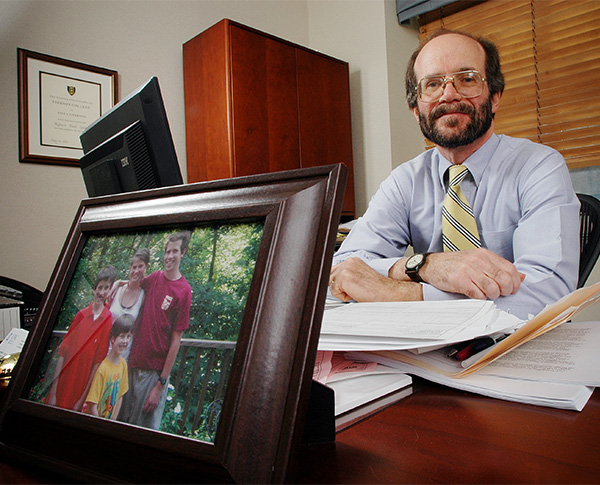
Golden and Kenney love to travel; spend time boating and water-skiing; and most of all, share time with their family.
About their dedication to always put their family first — a principle they encourage broadly — Golden says, “I cannot say enough about my wife, our four grown kids, and our grandchildren. Shannon has always been an inspiration. She is the true academic in the family, and I am amazed at the way she shrugs off barriers for women in science and medicine.”
Adding that three of their children have chosen to pursue careers in medicine, and the fourth is an entrepreneur who started a successful business in commercial real estate, Golden continues, “We are incredibly proud of our children for the kind of people they are, and that is reflected in the partners they are with. Also, two of the couples have children and are amazing parents.”
Related to his coming professional transition, Golden shares, “After I take about a month to catch up on sleep and read The New York Times from cover to cover, I will move into a new role mentoring faculty members and new leaders as I focus on opening doors for others as people have done for me.”
